Brutus of Troy, first King of Britain
By zteve t evans
According to medieval legend the founder and first king of Britain was the Trojan exile known as Brutus of Troy, who was said to be the descendant of the Trojan hero, Aeneas. This claim was first documented in a ninth century text the Historia Britonum attributed to Nennius, followed by an account given by Geoffrey of Monmouth in his Histori Regum Britanniae, in the 12th century. Brutus does not appear in classical works and is not regarded as being a historical figure by most historians.
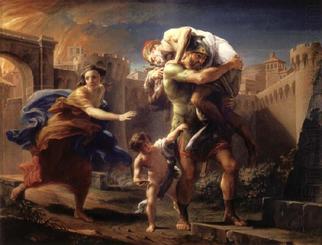 Aeneas fleeing from Troy by Pompeo Girolamo Batoni - Pu8blic Domain
Aeneas fleeing from Troy by Pompeo Girolamo Batoni - Pu8blic Domain
Who was Aeneas?
According to Classical myth and legend Aeneas was a prince of the Royal House of Troy which had two branches. The oldest being the House of the Dardanoi of Dardania, and the second, the House of Troy, which became the most powerful and the most famous. His father was Anchises a prince of the city of Dardania, founded by Dardanus. From his grandson, Tros, his people became known as the Trojans, and the son of Tros, known as Ilum, founded the city of Troy. The mother of Aeneas was the goddess Aphrodite making him semi-divine. Aeneas after the fall of Troy settled in Italy and was the forefather of Romulus and Remus and many of Rome’s rulers claimed descent from him and the House of of the Dardanoi and the House of Troy.
In the defense of Troy against the Greeks Aeneas played an heroic part and was only second in fighting ability to his cousin Hector the commander-in-chief of the Trojan defenders. He was saved from death by the gods more than once presumably to carry out his part in the great plan they had for the future of the world. After the fall of Troy he escaped carrying his aged father on his back to safety and led the Trojan survivors into exile as they travelled in foreign lands. Finally, they moved to Italy where they settled and he became the progenitor of the great Roman rulers and the Roman people.
According to Classical myth and legend Aeneas was a prince of the Royal House of Troy which had two branches. The oldest being the House of the Dardanoi of Dardania, and the second, the House of Troy, which became the most powerful and the most famous. His father was Anchises a prince of the city of Dardania, founded by Dardanus. From his grandson, Tros, his people became known as the Trojans, and the son of Tros, known as Ilum, founded the city of Troy. The mother of Aeneas was the goddess Aphrodite making him semi-divine. Aeneas after the fall of Troy settled in Italy and was the forefather of Romulus and Remus and many of Rome’s rulers claimed descent from him and the House of of the Dardanoi and the House of Troy.
In the defense of Troy against the Greeks Aeneas played an heroic part and was only second in fighting ability to his cousin Hector the commander-in-chief of the Trojan defenders. He was saved from death by the gods more than once presumably to carry out his part in the great plan they had for the future of the world. After the fall of Troy he escaped carrying his aged father on his back to safety and led the Trojan survivors into exile as they travelled in foreign lands. Finally, they moved to Italy where they settled and he became the progenitor of the great Roman rulers and the Roman people.
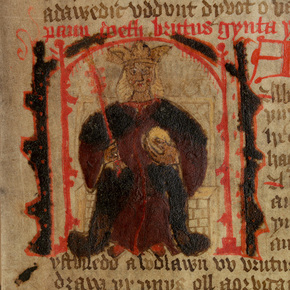 Brutus of Troy - Public Domain
Brutus of Troy - Public Domain
Brutus
Aeneas had a son called Ascanius who in turn and had a son. A sorcerer was asked tell what the future held for the boy and he told Ascanius that he would be the the best loved and most courageous man in Italy. This made Ascanius angry and he killed the sorcerer. His wife died giving birth to the boy who was named Brutus.
In a hunting accident when Brutus was in his teens he killed his father with an arrow and was punished by being exiled from Italy. Brutus left Italy and traveled among the islands of the Tyrrhenian Sea and spent time in Gaul, founding the city of Tours. Eventually with a band of followers he arrived in Britain defeating the few giants that populated the country. Naming the country after himself and reigning over it until his death. His sons were to split Britain into three parts to rule over.
Variations on Brutus's genealogy
There are a number of variation on the lineage of Brutus. In one version it is Silvius who was the son of Ascanius who is the father of Brutus and traces the lineage back to Ham, the son of Noah.
Another version gives Brutus a different lineage. in this his great grandfather is Numa Pompilius, a legendary Roman king who was the son of Ascanius a descendant of Japheth, Noah's son. The Christian references of these accounts conflicts with the Classical Trojan genealogies which trace the Trojan royal families back to the Greek gods, Zeus and the goddess, Electra.
In yet another version the father of Brutus is Hisicion, the son of Alanus who was the first European and whose lineage can be traced back to Japheth. Brutus also had three brothers Alamanus, Romanus and Francus who were also supposed to be the founders of other important European nations. From this the great nations of Europe traced their ruling ancestry back to Noah and his sons, the only human survivors of the Great Flood.
Geoffrey of Monmouth
In the account given by Geoffrey of Monmouth, Brutus is the grandson of Ascanius and his father is Silvius the son of Ascanius. A sorcerer is asked to predict the future of Brutus before his birth foretells that he will be a great man of many great achievements but also that Brutus would be the cause of the death of both his parents. His mother died giving birth to him and his father was accidently shot and killed by an arrow Brutus had fired while they were hunting together.
For punishment he is banished from his homeland and journeys to Greece. In Greece he comes across a band of Trojans who had become enslaved. To free them and become their leader he leads them in a war against Pandrasus, the Greek king. Brutus leads them to victory after attacking the king's camp at night and overwhelming the guards. He captures and holds Pandrasus hostage and forces him to set the Trojans free. Pandrasus, in gratitude for his life and probably to rid himself of the troublesome Trojans, also gives him his daughter, Ignoge, in marriage and enough ships and supplies to leave Greece.
Aeneas had a son called Ascanius who in turn and had a son. A sorcerer was asked tell what the future held for the boy and he told Ascanius that he would be the the best loved and most courageous man in Italy. This made Ascanius angry and he killed the sorcerer. His wife died giving birth to the boy who was named Brutus.
In a hunting accident when Brutus was in his teens he killed his father with an arrow and was punished by being exiled from Italy. Brutus left Italy and traveled among the islands of the Tyrrhenian Sea and spent time in Gaul, founding the city of Tours. Eventually with a band of followers he arrived in Britain defeating the few giants that populated the country. Naming the country after himself and reigning over it until his death. His sons were to split Britain into three parts to rule over.
Variations on Brutus's genealogy
There are a number of variation on the lineage of Brutus. In one version it is Silvius who was the son of Ascanius who is the father of Brutus and traces the lineage back to Ham, the son of Noah.
Another version gives Brutus a different lineage. in this his great grandfather is Numa Pompilius, a legendary Roman king who was the son of Ascanius a descendant of Japheth, Noah's son. The Christian references of these accounts conflicts with the Classical Trojan genealogies which trace the Trojan royal families back to the Greek gods, Zeus and the goddess, Electra.
In yet another version the father of Brutus is Hisicion, the son of Alanus who was the first European and whose lineage can be traced back to Japheth. Brutus also had three brothers Alamanus, Romanus and Francus who were also supposed to be the founders of other important European nations. From this the great nations of Europe traced their ruling ancestry back to Noah and his sons, the only human survivors of the Great Flood.
Geoffrey of Monmouth
In the account given by Geoffrey of Monmouth, Brutus is the grandson of Ascanius and his father is Silvius the son of Ascanius. A sorcerer is asked to predict the future of Brutus before his birth foretells that he will be a great man of many great achievements but also that Brutus would be the cause of the death of both his parents. His mother died giving birth to him and his father was accidently shot and killed by an arrow Brutus had fired while they were hunting together.
For punishment he is banished from his homeland and journeys to Greece. In Greece he comes across a band of Trojans who had become enslaved. To free them and become their leader he leads them in a war against Pandrasus, the Greek king. Brutus leads them to victory after attacking the king's camp at night and overwhelming the guards. He captures and holds Pandrasus hostage and forces him to set the Trojans free. Pandrasus, in gratitude for his life and probably to rid himself of the troublesome Trojans, also gives him his daughter, Ignoge, in marriage and enough ships and supplies to leave Greece.
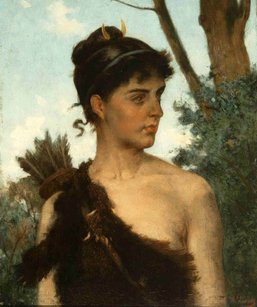 "Diana la Cazadora" del pintor chileno Pedro Lira (1845 - 1912) - Public Doamin
"Diana la Cazadora" del pintor chileno Pedro Lira (1845 - 1912) - Public Doamin
Brutus dreams of Diana
Brutus becomes the leader of a powerful band of Trojans and setting sail in his ships leaves Greece. On his travels he comes across a deserted island. Exploring the island he finds an abandoned temple to the goddess Diana. Brutus performs certain appropriate sacred rituals in honour of the goddess and falls asleep in front of the statue of the goddess. As he sleeps Diana appears to him in a dream and shows him visions of a fair island in the western oceans, called Albion, which is home to just a few giants. He learns from the dream that his destiny is to lead his followers there and settle the land founding a new nation destined for greatness.
Brutus sets sail again and after a close encounter with the Sirens lands in north Africa. After many adventures and travels he finds another band of Trojans living in exile by the shore of the Tyrrhenian Sea led by a great warrior named Corineus. Corineus is impressed with Brutus and the two Trojan bands unite under the leadership of Brutus and sail to Gaul on their way to Albion.
War in Gaul
While in Gaul, Corineus decides to go hunting in the forests but fails to ask permission from the king of Aquitaine, Goffarius Pictus. Goffarius is enraged and a war followers between him and the Trojans. One of the casualties was the nephew of Brutus, named Turonus who was killed in the fighting. Where Brutus buried him a city name Tours was founded.
The Trojans have more battles with the Gauls and although they are mostly victorious they are acutely aware that the Gauls have the advantage in numbers and in being on their home ground. Brutus and Corineus decide to return to the ships with their men snd continue their voyage to Albion.
Brutus becomes the leader of a powerful band of Trojans and setting sail in his ships leaves Greece. On his travels he comes across a deserted island. Exploring the island he finds an abandoned temple to the goddess Diana. Brutus performs certain appropriate sacred rituals in honour of the goddess and falls asleep in front of the statue of the goddess. As he sleeps Diana appears to him in a dream and shows him visions of a fair island in the western oceans, called Albion, which is home to just a few giants. He learns from the dream that his destiny is to lead his followers there and settle the land founding a new nation destined for greatness.
Brutus sets sail again and after a close encounter with the Sirens lands in north Africa. After many adventures and travels he finds another band of Trojans living in exile by the shore of the Tyrrhenian Sea led by a great warrior named Corineus. Corineus is impressed with Brutus and the two Trojan bands unite under the leadership of Brutus and sail to Gaul on their way to Albion.
War in Gaul
While in Gaul, Corineus decides to go hunting in the forests but fails to ask permission from the king of Aquitaine, Goffarius Pictus. Goffarius is enraged and a war followers between him and the Trojans. One of the casualties was the nephew of Brutus, named Turonus who was killed in the fighting. Where Brutus buried him a city name Tours was founded.
The Trojans have more battles with the Gauls and although they are mostly victorious they are acutely aware that the Gauls have the advantage in numbers and in being on their home ground. Brutus and Corineus decide to return to the ships with their men snd continue their voyage to Albion.
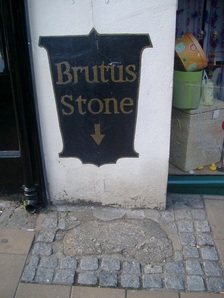 Brutus stone in Totnes
Brutus stone in Totnes
Totnes
On reaching the shore of Albion they land on "Totonesium litus" or the sea coast of Totnes. According to legend as he stepped ashore he said “Here I stand and here I rest. And this town shall be called Totnes.”
The founding of Britain and Cornwall
Today the Brutus Stone is said to mark that spot in the modern day town of Totnes. Brutus found Albion to be a good and fertile land with good hunting and only a few giants inhabiting it just as the goddess Diana had told him it would be. He renames the island Britain, a derivative of his own name, becoming its first king and the inhabitants become known as Britons. He gives the large south western peninsula to Corineus who names it Cornwall after himself and becomes its first ruler.
Goemagot
During a festival the Trojans are attacked by the giants and in the battle all of the giants except their leader Goemagot are killed. Brutus takes Goemagot prisoner saving him for a wrestling match with Corineus. During the wrestling Goemagot breaks one of the ribs of Corineus. Enraged, Corineus throws the giant over a cliff to his death.
The founding of London
Brutus founds the city of Troia Nova or New Troy on the banks of the River Thames. Over time the name of the city becomes corrupted to Trinovantum and later becomes London and destined to be one of the greatest cities in the world.
On reaching the shore of Albion they land on "Totonesium litus" or the sea coast of Totnes. According to legend as he stepped ashore he said “Here I stand and here I rest. And this town shall be called Totnes.”
The founding of Britain and Cornwall
Today the Brutus Stone is said to mark that spot in the modern day town of Totnes. Brutus found Albion to be a good and fertile land with good hunting and only a few giants inhabiting it just as the goddess Diana had told him it would be. He renames the island Britain, a derivative of his own name, becoming its first king and the inhabitants become known as Britons. He gives the large south western peninsula to Corineus who names it Cornwall after himself and becomes its first ruler.
Goemagot
During a festival the Trojans are attacked by the giants and in the battle all of the giants except their leader Goemagot are killed. Brutus takes Goemagot prisoner saving him for a wrestling match with Corineus. During the wrestling Goemagot breaks one of the ribs of Corineus. Enraged, Corineus throws the giant over a cliff to his death.
The founding of London
Brutus founds the city of Troia Nova or New Troy on the banks of the River Thames. Over time the name of the city becomes corrupted to Trinovantum and later becomes London and destined to be one of the greatest cities in the world.
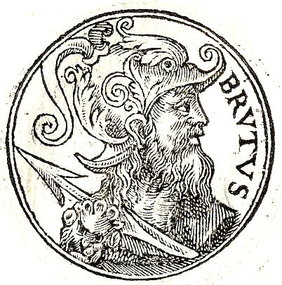 Brutus of Britain - Public Domain
Brutus of Britain - Public Domain
The death of Brutus
Brutus gives his people laws and rules over them for 24 years until his death and is buried in Trinovantum. His kingdom of Britain is then divided into three kingdoms ruled by his three sons Locrinus who ruled England, Albanactus who ruled Scotland and Kamber who ruled Wales.
The medieval quest for status
Many modern historians believe the myths and stories such as those around Brutus were deliberately designed to give a nation an ancient lineage in the belief that it added legitimacy to the rulers. It was a kind of one upmanship for a king to claim to be better connected through ancestry than neighbouring kings or even rivals to the throne. Many other medieval European rulers made similar such claims supported by scholars who cited the Table of Nations, or Sons of Noah which appeared in Genesis 10 of the Hebrew Bible and traced the lineages of the rulers of the great nations of the world back to Noah and his sons.
Iman Jacob Wilkens
In a lecture published on his internet site based on his book Where Troy Once Stood, Iman Jacob Wilkens challenges the traditional idea that Troy was situated in northwest Anatolia in what is now Turkey. or Asia Minor. Instead he places it in the Gog Magog Hills, Cambridgeshire in England! In his view the attacking Greeks were Celts who were laying siege to fellow Celts. The prize they were after was not the famous and beautiful Helen but tin!
The Bronze Age got its name from the alloy of 90% copper and 10% tin called bronze which was used to make many different artifacts and was important to the economy of the time. Although copper was available tin was only found in a few places in Europe. The major tin centres of Europe were found at Erzgebirge along the present day border Czech Republic and Germany, the Iberian Peninsula, Brittany and Devon and Cornwall in the south west of England and a Bronze Age tin mine has now been discovered in Turkey. Importantly bronze was used to produce the best weaponry of the age and would have been much sought after by the Celts and other peoples.
Wilkens bases many of his claims on a reading of the place names in Homer’s Illiad and Odyssey and if he is right it changes the entire dynamics of the history of the Classics and the fall of Troy. His views are interesting and he raises many pertinent points but are not widely accepted by the academic establishment though they do have merit and should not be dismissed out of hand.
The academic establishment is dismissive of ancient writers such as Nennius and Geoffrey of Monmouth and just about any other historian today who dares to break ranks with the established order. Nonetheless these historians lived in their own times writing for the people of those times just as the academics of today are part and parcel of the times they live in. Any judgements need to be taken in context with the times because times and human values and attitudes change and so will meaning, and the world will change, like it or not.
© 19/01/2015 zteve t evans
Brutus gives his people laws and rules over them for 24 years until his death and is buried in Trinovantum. His kingdom of Britain is then divided into three kingdoms ruled by his three sons Locrinus who ruled England, Albanactus who ruled Scotland and Kamber who ruled Wales.
The medieval quest for status
Many modern historians believe the myths and stories such as those around Brutus were deliberately designed to give a nation an ancient lineage in the belief that it added legitimacy to the rulers. It was a kind of one upmanship for a king to claim to be better connected through ancestry than neighbouring kings or even rivals to the throne. Many other medieval European rulers made similar such claims supported by scholars who cited the Table of Nations, or Sons of Noah which appeared in Genesis 10 of the Hebrew Bible and traced the lineages of the rulers of the great nations of the world back to Noah and his sons.
Iman Jacob Wilkens
In a lecture published on his internet site based on his book Where Troy Once Stood, Iman Jacob Wilkens challenges the traditional idea that Troy was situated in northwest Anatolia in what is now Turkey. or Asia Minor. Instead he places it in the Gog Magog Hills, Cambridgeshire in England! In his view the attacking Greeks were Celts who were laying siege to fellow Celts. The prize they were after was not the famous and beautiful Helen but tin!
The Bronze Age got its name from the alloy of 90% copper and 10% tin called bronze which was used to make many different artifacts and was important to the economy of the time. Although copper was available tin was only found in a few places in Europe. The major tin centres of Europe were found at Erzgebirge along the present day border Czech Republic and Germany, the Iberian Peninsula, Brittany and Devon and Cornwall in the south west of England and a Bronze Age tin mine has now been discovered in Turkey. Importantly bronze was used to produce the best weaponry of the age and would have been much sought after by the Celts and other peoples.
Wilkens bases many of his claims on a reading of the place names in Homer’s Illiad and Odyssey and if he is right it changes the entire dynamics of the history of the Classics and the fall of Troy. His views are interesting and he raises many pertinent points but are not widely accepted by the academic establishment though they do have merit and should not be dismissed out of hand.
The academic establishment is dismissive of ancient writers such as Nennius and Geoffrey of Monmouth and just about any other historian today who dares to break ranks with the established order. Nonetheless these historians lived in their own times writing for the people of those times just as the academics of today are part and parcel of the times they live in. Any judgements need to be taken in context with the times because times and human values and attitudes change and so will meaning, and the world will change, like it or not.
© 19/01/2015 zteve t evans
References and Attributions
Copyright January 19th, 2015 zteve t evans
Copyright January 19th, 2015 zteve t evans
- Brutus stone in Totnes - CC BY-SA 3.0view terms - Uploaded by Alex1011 to Wikimedia Commons
- Brutus of Troy - Wikipedia, the free encyclopedia
- Sons of Noah - Wikipedia, the free encyclopediaTin sources and trade in ancient times
- Tin sources and trade in ancient times
- Trojan Kings of England - TROY
